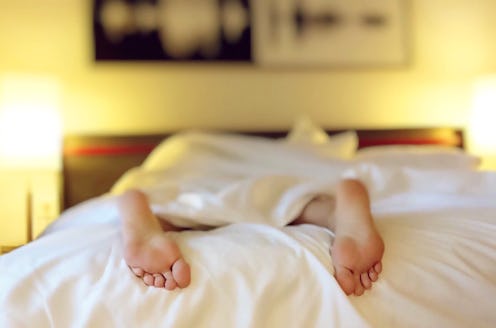Life
8 Hacks To Help You Get At Least 8 Hours Of Sleep
The National Sleep Foundation recommends that most adults get seven to nine hours of sleep per night. All of that sleep sounds fantastic — in theory. Actually getting that much sleep is a lot easier said than done. Luckily, there are simple sleep hacks that will help you get eight hours of Zzzzs every night. These lifestyle changes — from tweaking your schedule to switching up your late-night snacks — will help you sleep longer and improve the quality of the sleep you have.
The reasons that we need sleep are still a bit of a mystery — scientists continue to debate what sleep is actually for. But what is very clear is that humans need sleep (abundant, regular sleep) to survive and thrive. Sleep deprivation can cause mood swings, impaired cognition and memory, decreases in hand-eye coordination,and even compromised hearing. According to a 2010 study, going without sleep for 24 hours is equivalent to having a blood-alcohol level of 0.10 percent. In the long term, chronically inadequate sleep can lead to heart failure, heart attack, high blood pressure, stroke, and diabetes, according to the Cleveland Clinic.
In contrast, getting good sleep offers a range of health benefits. Adequate sleep can boost your mood and immunity, increase alertness, improve your skin, and boost your overall health and wellbeing. But actually finding enough time to sleep — and sleeping soundly when you are in bed — can be surprisingly difficult. Try out these sleep hacks to make getting your eight hours a little easier:
1. Get on a schedule.
Human bodies are creatures of habit, especially when it comes to sleep. Sticking to a regular sleep schedule of going to bed and waking up at the same times every day (even on the weekends!) will help your body to know when it’s supposed to be in sleep-mode.
2. Turn off your screens before bed.
Our circadian rhythms — the internal “body clock” that tells us when to be awake and when to be asleep — are deeply affected by light. Put simply, light makes our bodies tell us to wake, while darkness makes our bodies think it’s time to sleep. Even small amounts of light — like,say, the glow of a cell phone or tablet screen — can disrupt these rhythms and make sleeping difficult. Incorporate a “screens off” policy as part of your bedtime routine, shutting down your devices a couple hours before bed. Doing so will have the added benefit of keeping you from checking your email and social media — often sources of stress — when you’re trying to wind down.
3. Keep it cool.
Your body temperature naturally dips slightly in the middle of the night and then warms again as you approach waking. A bedroom that is too hot can interfere with your body’s ability to lower its temperature, which can, in turn, disrupt your sleep. So if you’re having trouble staying asleep at night, lower the temperature in your room by a few degrees. Sleep experts say to aim for a room that’s about 65 degrees.
4. Exercise.
Regular exercise contributes to good sleep in a number of ways. For one thing, it tires out the body, making it easier to fall and stay asleep, but it also reduces stress, anxiety, and depression — all things that can cause sleeplessness. Just be sure not to exercise right before bed; doing so might make you too energized and warm to fall asleep.
Research shows that, if you have chronic insomnia, the relationship between exercise and sleep is a little more complicated; at first, exercising may not seem to make sleeping any easier. Just stick with it— studies show that, after four months of regular exercise, folks suffering from chronic insomnia will get significantly more sleep than they were before.
5. Avoid heavy food before bed.
Spicy or heavy foods can be difficult to digest and can, therefore, disrupt sleep. If you want a late-night snack, aim for foods that contain the sleep-aiding amino acid tryptophan, like nuts, bananas, and dairy products. (So night cheese is actually not a terrible idea!)
6. Limit your alcohol before bed.
Alcohol may make you fall asleep easily (It is a sedative, after all), but it can interfere with your ability to stay asleep. Alcohol has been shown to disturb REM sleep, causing wakefulness and difficulty falling back to sleep. According to the NIH, alcohol consumed as much as six hours before going to bed can mess with sleep. There are two lessons here: Avoid drinking alcohol right before bed in general, and, if you’re having problems with insomnia, lay off the happy hour cocktails, too.
7. Switch to decaf in the afternoons.
Caffeine is a stimulant, so it’s no surprise that it can disrupt your sleep if you consume it too close to bedtime. A 2013 study found that caffeine consumed six hours before bedtime was still enough to significantly disrupt sleep — so in the afternoons and evenings, be sure to switch over to decaf coffee or herbal teas.
8. Cut out the cigarettes.
There are approximately 80,000 reasons to quit smoking, but here’s another: Nicotine is a stimulant, so it can have a major impact on smokers’ ability to sleep. For example, smokers have higher than average rates of restless sleep and obstructive sleep apnea.
Happy sleeping, everyone!
